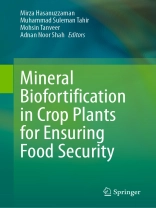This book provides a comprehensive summary of the recent advances in the biofortification of plants under climate change and how it affects food security globally. The need for mineral biofortification to eradicate or alleviate malnutrition through sustainable agriculture is also discussed.
Biofortification of edible plants is considered the most appropriate approach to alleviate nutritional problems and nutrient deficiencies. In contrast, biofortification focuses on improving the nutritional content of the region’s current agricultural biodiversity while preserving its habits and customs. Emphasis is also placed on recent advances and developments in omics, particularly metabolomics and related techniques, to unravel the potential alterations in plants caused by biofortification. The book brings together eminent scientists to present the latest developments in the field.
This timely publication addresses practical scenarios of bio-fortified food production and climate change. The book focuses on the methods, techniques, and environmental changes used to enhance and improve agricultural products. This book is one of the first to provide information on the use of modern biotechnologies to modify crops for health benefits. It also examines the mechanisms of the plant responses to genetically induced biofortification, the production and responses of fortified plants under climate change, and their effects on food security.
The book will be useful for students and researchers, especially crop scientists, environmental scientists, biotechnologists, botanists, and agronomists, to understand the techniques and mechanisms of biofortification, and responses of biofortified plants under climate change.
Содержание
1. Agronomic Biofortification- An Effective Tool for Alleviating Nutrient Deficiency in Plants and Human Diet.- 2. The Role of Biofortification in Enhancing Plant Growth, Development, Yield, and Quality.- 3. Improving Zinc Biofortification in Plants 4. Biofortification of Zinc: Uptake from the Soil and Transportation up to the Grains through ZIP Family Transporters.- 5. Mechanisms of Iron Uptake and Homeostasis in Plants: Implications for Biofortification in Cereal Grains.- 6. Selenium Biofortification in Agronomic Crops.- 7. Selenium Bio-fortification in Cereal Crops: An Overview.- 8. Nanoparticles Based Biofortification in Food Crops: Overview, Implications, and Prospects.- 9. Role of Nanoparticles in Improving Biofortification.- 10. Role of Nanoparticles in Improving Biofortification of Zinc and Iron in Vegetables.- 11. Scope of Seed Priming in Inducing Biofortification in Plants.- 12. Biofortification Through Seed Priming in Food Crops; Potential Benefits and Future Scope.- 13. Biochar for the Improvement of Crop Production.- 14. Phytohormones as Stress Mitigators in Plants.
Об авторе
Dr. Mirza Hasanuzzaman is a Professor of Agronomy at Sher-e-Bangla Agricultural University, Dhaka, Bangladesh. He received his Ph.D. from the United Graduate School of Agricultural Sciences, Ehime University, Japan with a Japanese Government (MEXT) Scholarship. Later, he completed his postdoctoral research in the Center of Molecular Biosciences (COMB), University of the Ryukyus, Okinawa, Japan with a ‘Japan Society for the Promotion of Science (JSPS)’ postdoctoral fellowship. Subsequently, he became an Adjunct Senior Researcher at the University of Tasmania with an Australian Government’s Endeavour Research Fellowship. Dr. Mirza Hasanuzzaman is one of the Highly Cited Researchers recognized by Clarivate Analytics. He published over 250 articles and edited over 20 books on important aspects of plant physiology, plant stress tolerance, and crop production. According to Scopus, Prof. Hasanuzzaman’s publications have already received over 16000 citations with an h-indexof 66. Prof. Hasanuzzaman supervised the dissertations of 41 master’s and 3 Ph.D. students. Dr. Hasanuzzaman is an editor and reviewer of more than 100 international journals and was a recipient of the ‘Publons Global Peer Review Award 2017, 2018 and 2019’ which is managed by Web of Science. He is a Fellow of Bangladesh Academy of Sciences, The Linnean Society of London, Royal Society of Biology, and International Society of Environmental Botanists. He received the World Academy of Science (TWAS) Young Scientist Award 2014, University Grants Commission (UGC) Gold Medal 2018, Global Network of Bangladeshi Biotechnologists (GNOBB) Award 2021 and Society for Plant Research Young Scientist Award (Agriculture)-2023.
Dr. Muhammad Suleman Tahir is a Professor in the Department of Chemical Engineering, Khwaja Fareed University of Engineering and Information Technology, Pakistan and Vice Chancellor at Khwaja Fareed University of Engineering and Information Technology Rahim Yar Khan. He was a Dean at the University of Gujrat, Pakistan. He has a long-standing experience in the petroleum industry. Besides being a Post Doc & Ph D in Chemical Engineering from Graz University of Technology in Austria, he is a renowned national and international speaker. He has authored several books & book chapters and several national and international research articles. His enriched experience in projects includes completion of 15 construction projects at the University of Gujrat, 3 community training projects under the umbrella of NAVTTC and 5 research projects with HEC.
Dr. Mohsin Tanveer received his Ph D in Plant Physiology from the University of Tasmania Australia. Since 2021, he is working as an associate researcher in Plant Physiology Lab, University of Tasmania Australia. He joined the Chinese Academy of Science in 2022 as a special research assistant and is currently leading two projects on salinity tolerance in halophytes as co-PI. His research interests include plant stress physiology, nutrient metabolism, ion transport and agricultural sustainable development. In 2021, he was listed among the top 40 young researchers in Australia and ranked first in the field of Botany.
Dr. Adnan Noor Shah received his Ph.D. in Agronomy from Huazhong Agriculture University, China in 2017. His specialization includes plant nutrition, plant-soil interaction, crop physiology, crop cultivation, farming system, crop ecology, and plant abiotic stress responses, in addition to this, he is working on plant genomics and epigenetics. He served as an assistant professor at Gomal University Dera Ismail Khan, Pakistan from 2018 to 2019. In addition, he completed his two-year post-doctoral fellowship at Anhui Agricultural University, China from 2019-2021. Now he is working as an assistant professor in the Department of Agricultural Engineering, Khwaja Fareed University of Engineering and Information Technology, Pakistan since March 2022. He is on the editorial board of various international and national journals, BMC Plant Biology, International Journal of Plant Production, Functional plant biology, Frontiers in plant science, Frontiers in Agronomy, Journal of Pure and Applied Agriculture, Agriculture-MDPI.












